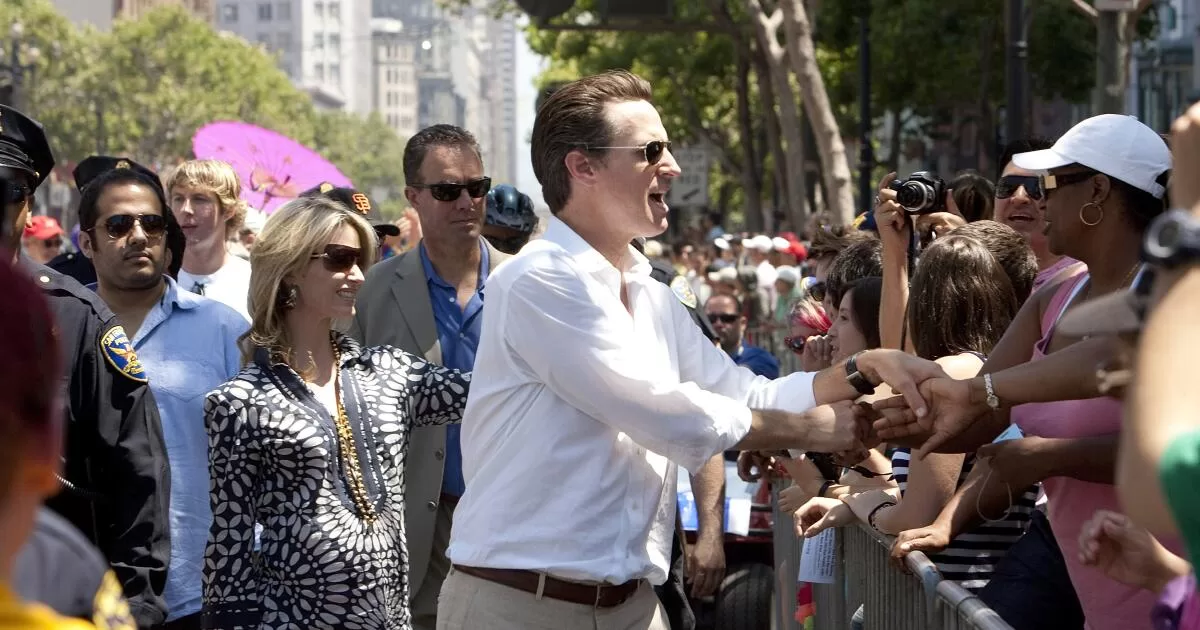Kicking off Pride Month, the Democratic governor is promoting a measure on the November ballot that would remove language in the state Constitution that still defines marriage as between a man and woman.
While courts have deemed the outdated state definition unenforceable and unconstitutional, the initiative comes as LGBTQ+ groups are urging caution about the possibility of another Donald Trump presidency and potential rulings from a conservative Supreme Court majority he helped appoint.
“Why do we feel we need to do this? What more evidence do you need? Wake up to the world we’re living in,” Newsom said Friday at Manny’s, a cafe in the Mission District that has become a go-to venue for Democratic campaigns. “It’s profound and precious progress. You can’t take it for granted.”
Newsom and supporters of the measure at Friday’s event, including San Francisco Mayor London Breed and State Sen. Scott Wiener (D-San Francisco), pointed to the Supreme Court’s undoing of Roe vs. Wade as proof that rights — including the right to marriage — are not certain.
After the Supreme Court in 2022 overturned Roe vs. Wade, ending the constitutional right to abortion, longtime conservative Justice Clarence Thomas said in a concurring opinion that the court should also reconsider rulings that rely on similar legal reasoning, such as those that protect same-sex marriage and access to contraception.
California and other states have since passed ballot measures to enshrine abortion rights in their constitutions. The same needs to be done for LGBTQ+ rights, Newsom said.
“Here we are in 2024, and we’re not experiencing a rights expansion, we’re experiencing a rights regression,” he said.
The marriage definition in California’s current Constitution dates to 2008, when voters approved a ban on same-sex marriage with Proposition 8. That has since been overturned in court, and liberal California remains a leader on LGBTQ+ rights. But the language in Proposition 8 remains on the books.
Although there is no current threat to the legality of same-sex marriage, and President Biden signed a bill attempting to safeguard it in 2022, supporters of the measure are taking no chances. They say the outdated language in California’s Constitution must be erased for good.
State Sen. Toni Atkins (D-San Diego), the former California Senate leader who is running for governor in 2026, thanked Newsom personally for allowing her to legally marry her wife in 2008, reflecting on the so-called summer of love, when LGBTQ+ couples rushed to wed ahead of the vote on Proposition 8.
Atkins said she officiated at 18 weddings that year, and remembered sometimes attending multiple ceremonies in one day — but that came to “a devastating end” when Proposition 8 passed. Since the initiative was ruled unconstitutional, the Supreme Court ensured the right to same-sex marriage in 2015.
“In California today, we believe the ability to marry who you love is a fundamental right. And while we may feel a sense of security … we can’t become complacent in our fight to protect our rights,” Atkins said Friday.
The California Family Council, a conservative policy organization, opposes the November ballot measure. Spokesperson Greg Burt said in a statement that marriage between a man and a woman creates “the optimal family environment” for children, and that the law shouldn’t “tamper” with what he called “the natural order.”
But most Californians’ views have changed since Proposition 8.
Polling by the Public Policy Institute of California in 2021 showed that an overwhelming majority of Californians support protections for the LGBTQ+ community. A recent nationwide poll conducted for The Times by NORC at the University of Chicago, though, showed a clear political divide in how Americans view the influence of LGBTQ+ people in society, with three out of four Democrats saying that impact is positive and nearly the same share of Republicans saying it has been negative.
